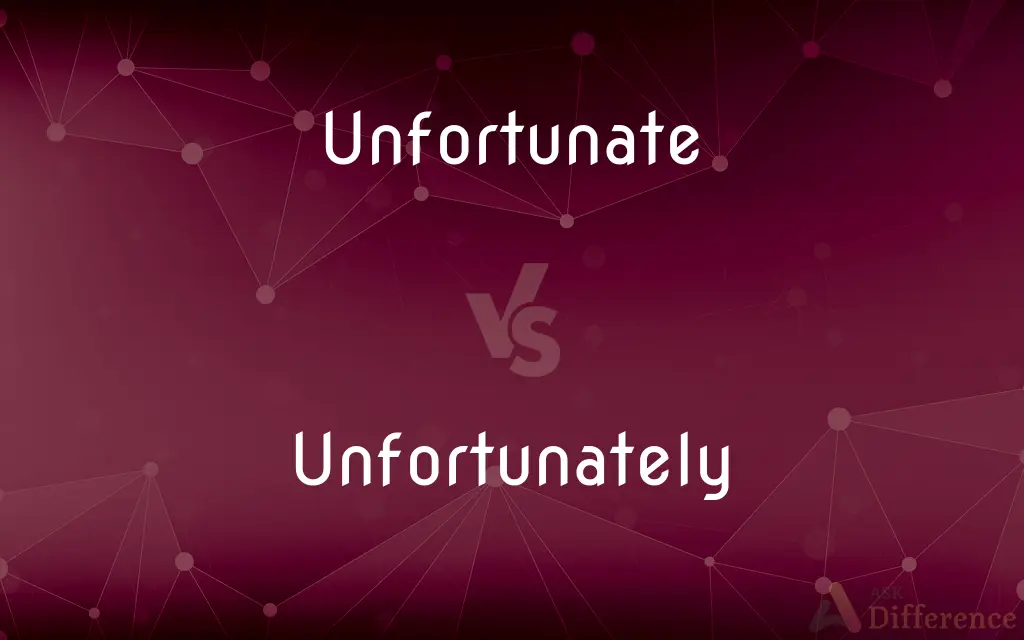Unfortunate vs. Unfortunately — What's the Difference?
By Urooj Arif & Maham Liaqat — Updated on April 29, 2024
"Unfortunate" describes something detrimental or regrettable, while "unfortunately" is an adverb used to express regret or disappointment in a situation.

Difference Between Unfortunate and Unfortunately
Table of Contents
ADVERTISEMENT
Key Differences
"Unfortunate" is an adjective used to describe events, outcomes, or conditions that are harmful or regrettable, suggesting bad luck or misfortune. Whereas "unfortunately" functions as an adverb, setting the tone for a sentence by indicating that what follows is negative or undesirable.
"Unfortunate" can modify nouns directly, as in describing situations (e.g., an unfortunate incident) or characteristics (e.g., an unfortunate person). On the other hand, "unfortunately" modifies verbs or whole sentences, introducing a statement with a tone of regret (e.g., Unfortunately, we arrived too late).
The use of "unfortunate" allows for descriptive flexibility, fitting into various contexts where something negative is being described. In contrast, "unfortunately" is primarily used in speech or writing to transition into or emphasize a disappointing aspect of the discourse.
"Unfortunate" often appears in more formal or detailed descriptions, providing a qualitative assessment of scenarios or traits. Whereas "unfortunately" is frequently employed in casual conversation or written communication, serving as a conversational marker to prep the listener or reader for bad news.
The tone conveyed by "unfortunate" can range from mildly disappointing to severely detrimental, depending on the context. Meanwhile, "unfortunately" typically introduces a statement with a straightforward expression of regret, without varying much in intensity.
ADVERTISEMENT
Comparison Chart
Part of Speech
Adjective
Adverb
Function
Describes nouns
Modifies sentences or verbs
Usage Context
Formal and informal
Mostly informal
Example of Use
An unfortunate event occurred.
Unfortunately, we must leave now.
Tone Variation
Can vary from mild to severe
Generally straightforward regret
Compare with Definitions
Unfortunate
Characterized by undesired outcomes.
It was an unfortunate accident.
Unfortunately
Expressing pity or sorrow.
Unfortunately, we cannot attend your wedding.
Unfortunate
Not favorable or prosperous.
They live in unfortunate circumstances.
Unfortunately
As luck would have it in an unfavorable manner.
Unfortunately, our team lost the game.
Unfortunate
Inauspicious or adverse.
The weather took an unfortunate turn.
Unfortunately
Used to admit something regrettable.
Unfortunately, the project was delayed.
Unfortunate
Regrettable or inappropriate.
Her comments were quite unfortunate.
Unfortunately
Signifying the onset of negative news.
Unfortunately, I have bad news to share.
Unfortunate
Having or marked by bad fortune; unlucky.
He was unfortunate to lose his keys.
Unfortunately
Indicating the occurrence of something undesirable.
Unfortunately, the weather worsened.
Unfortunate
Having or marked by bad fortune; unlucky
There'd been an unfortunate accident
Unfortunately
It is unfortunate that
Unfortunately, we do not have the time to interview every applicant
Unfortunate
Regrettable or inappropriate
His unfortunate remark silenced the gathering
Unfortunately
Having bad luck; unlucky.
Unfortunate
A person who suffers bad fortune
Those unfortunates whose lives are marred by poverty
Unfortunately
Characterized by, bringing, or causing misfortune
An unfortunate turn of events.
Unfortunate
A person who is considered immoral or lacking in religious faith or instruction, especially a prostitute.
Unfortunately
Regrettable; deplorable
An unfortunate lack of good manners.
Unfortunate
Having bad luck; unlucky.
Unfortunately
A victim of bad luck.
Unfortunate
Characterized by, bringing, or causing misfortune
An unfortunate turn of events.
Unfortunately
Happening through bad luck, or because of some unfortunate event.
The houses which burned down could have been saved. Unfortunately, the fire truck had broken down on the way.
Unfortunate
Regrettable; deplorable
An unfortunate lack of good manners.
Unfortunately
By bad luck;
Unfortunately it rained all day
Alas, I cannot stay
Unfortunate
A victim of bad luck.
Unfortunate
Not favored by fortune
Unfortunate
Marked or accompanied by or resulting in misfortune
Unfortunate
An unlucky person; one who has fallen into bad circumstances.
Unfortunate
A prostitute.
Unfortunate
Not fortunate; unsuccessful; not prosperous; unlucky; attended with misfortune; unhappy; as, an unfortunate adventure; an unfortunate man; an unfortunate commander; unfortunate business.
Unfortunate
A person who suffers misfortune
Unfortunate
Not favored by fortune; marked or accompanied by or resulting in ill fortune;
An unfortunate turn of events
An unfortunate decision
Unfortunate investments
An unfortunate night for all concerned
Unfortunate
Not auspicious; boding ill
Unfortunate
Unsuitable or regrettable;
An unfortunate choice of words
An unfortunate speech
Common Curiosities
What part of speech is "unfortunate"?
Adjective.
Is "unfortunately" used to start a sentence?
Yes, it often starts a sentence or clause.
What is the main function of "unfortunately"?
To introduce or emphasize a regrettable fact.
How does "unfortunate" affect the tone of a statement?
It indicates a negative situation or characteristic.
How does "unfortunately" affect the tone of a conversation?
It sets a regretful or apologetic tone.
What part of speech is "unfortunately"?
Adverb.
Can "unfortunate" be used in a positive context?
No, it generally conveys negative aspects.
Can "unfortunate" modify verbs?
No, it modifies nouns.
Can "unfortunately" modify adjectives?
No, it modifies verbs or entire sentences.
Do "unfortunate" and "unfortunately" have similar meanings?
They share a thematic link of negativity but differ in grammatical function.
Can "unfortunately" be replaced with "unfortunate" in a sentence?
No, because they serve different grammatical roles.
What synonyms can be used for "unfortunate"?
Regrettable, unlucky, adverse.
Is "unfortunately" formal or informal?
It is more commonly used in informal contexts.
Share Your Discovery

Previous Comparison
Dandy vs. Fop
Next Comparison
Kerala vs. LadakhAuthor Spotlight
Written by
Urooj ArifUrooj is a skilled content writer at Ask Difference, known for her exceptional ability to simplify complex topics into engaging and informative content. With a passion for research and a flair for clear, concise writing, she consistently delivers articles that resonate with our diverse audience.
Co-written by
Maham Liaqat















































